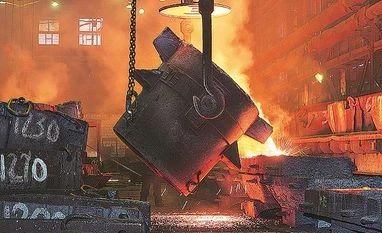Stocks of domestic steel companies such as Tata Steel, JSW Steel, Steel Authority of India (SAIL) and Jindal Steel and Power (JSPL) have surged 24-134 per cent from lows seen in early April. While resumption of economic activities in the country post easing of lockdown has improved sentiment, the rebound in Chinese demand too is encouraging. Likewise, the recent news flow on government's support measures also bode well. This includes the imposition of anti-dumping duty on flat-rolled steel products, plated or coated with aluminium and zinc, also referred to as Galvalume steel. It is also expected that the government will take more measures to support the domestic steel industry. But, its still far from hunky-dory.
Although Galvalume imports are small in quantity and therefore the anti-dumping duty has limited benefits (JSW Steel and Tata Steel to benefit marginally), this strengthens our belief regarding continuous government support to steel industry which will keep imports under check, said an analyst at a domestic brokerage.
Jayanta Roy at ICRA Ratings says that the anti-dumping duties were already there for last one year but was provisional, and now the government has finalised it to be applicable for four more years.
The continuation of anti-dumping duty will ensure level playing field for domestic companies versus imports. On further measures, analysts at Emkay Research feel that easier/faster compliances for opening of mines recently won in e-auctions can boost the sector's prospects.
Meanwhile, economic activity in China is gaining pace and Chinese steel output has risen 8.5 per cent to all-time high of 92.27 million tonne (MT) in May 2020 compared to April, according to Kotak Institutional Equities' latest metals update. On a year-on-year basis too, the output in May is higher by 4.2 per cent, and analysts attribute it to strong demand from the construction sector as China also saw cement output jump more than 8 per cent.
In India, too, demand is inching up post the easing of lockdown. Steel consumption for the month of May was at 3.1 MT. Though it was 65 per cent lower on a year-on-year basis, it was much better than April's figure of 1 MT, according to PhillipCapital. The capacity utilisation is also improving and is pegged at 85 per cent in June as compared to 50 per cent in May.
On the flip side, the first half of 2020-21 is likely to remain challenging, says Roy, who expects demand normalisation to be achieved only by March 2021 quarter. Overall, steel demand is expected to decline by 20-22 per cent year-on-year in FY21, according to estimates of ICRA, and that too provided there is no second wave of Covid-19 infections leading to more lockdowns. Emkay Research, in fact, believes that demand will normalise only from June 2021 quarter.
In the absence of sufficient domestic demand, large producers are currently tapping the export market. This can be seen in the sharp jump in net steel exports in May to 745,000 tonnes compared to imports of 217,000 tonnes in the corresponding period last year. While this is supporting volumes and provides breathing space to domestic manufacturers, exports fetch lower realisations and hence may not reflect favourably on their June quarter profitability, feel analysts.
The rising production in China is also not good news for exports, especially of billet.
Lastly, domestic prices remain under pressure with subdued demand. The near term pricing outlook is also not encouraging as higher domestic supplies will keep realisations under pressure.
Regarding individual companies, analysts say, lower prices of raw materials such as coal and iron ore will benefit convertors such as JSW Steel. For JSPL, the benefits from higher volumes may continue and Sarda mine iron ore inventories will help drive earnings and reduce debt, feels Amit Murarka of Motilal Oswal Financial Services. For Tata Steel, its integrated cost-efficient Indian operations lend comfort, but lower coal costs can benefit mainly its European operations. The key for its Europe business, however, is the success of ongoing restructuring attempts. For SAIL, while subdued realisations don’t bode well, “The company can benefit from current levels as its mills are ready to produce value-added products as soon as demand resumes,” say analysts at Emkay Research who prefer companies with higher domestic sales and those without any IBC commitment.
Unlock 30+ premium stories daily hand-picked by our editors, across devices on browser and app.
Pick your 5 favourite companies, get a daily email with all news updates on them.
Full access to our intuitive epaper - clip, save, share articles from any device; newspaper archives from 2006.
Preferential invites to Business Standard events.
Curated newsletters on markets, personal finance, policy & politics, start-ups, technology, and more.
)